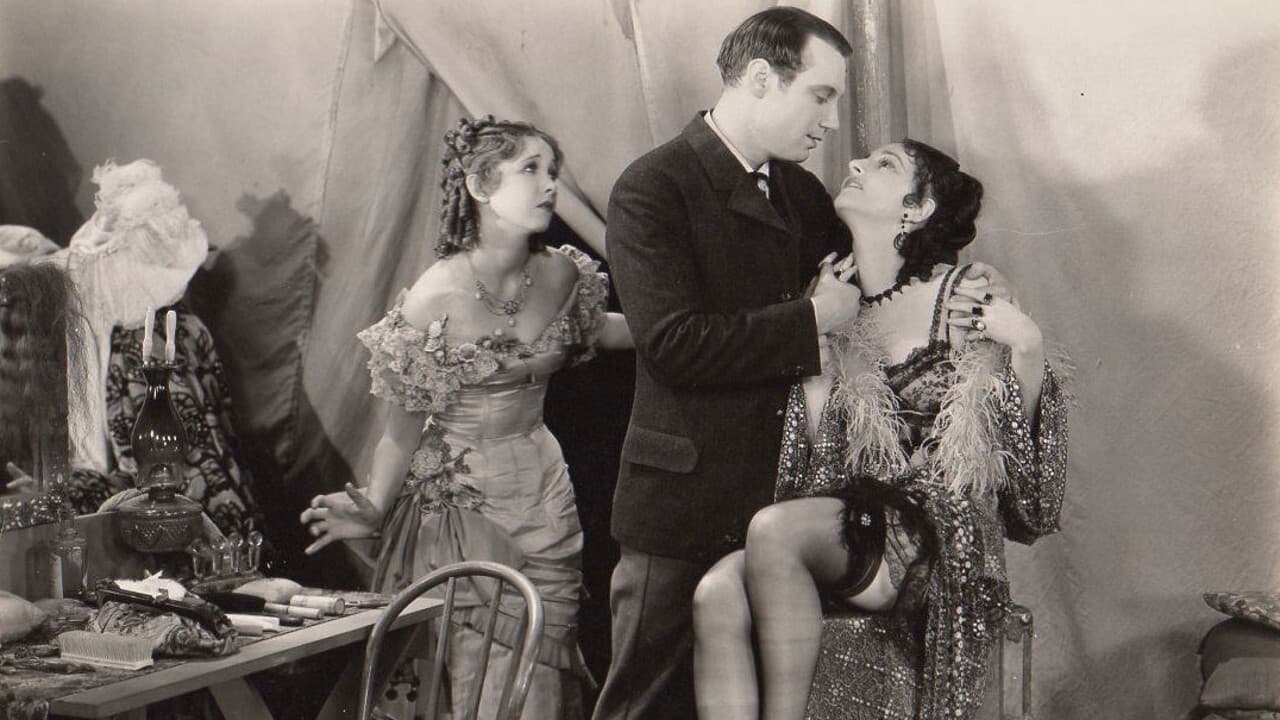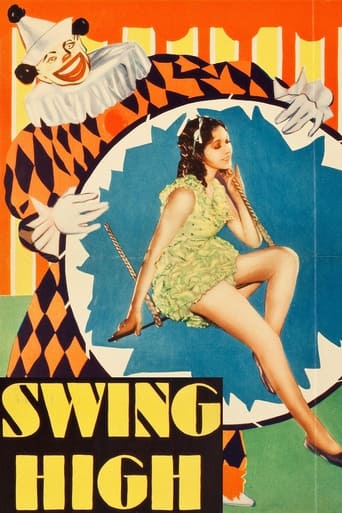

There's jealousy amongst the lovely trapeze ladies in this circus musical melodrama which is very similar in nature to the same year's "Dangerous Curves", starring Clara Bow, Richard Arlen and Kay Francis. Romantic duets and Negro spirituals (as they were called back then) interrupt the drama every five minutes in this story of the vixen (Dorothy Burgess) who threatens to come between circus sweethearts Helen Twelvetrees and Fred Scott, as well as the mystery of who has been embezzling from the coffers. While the romantic duets may threaten your ability to stay awake, a production number (with the black servants putting together the circus tent while singing) is spectacularly staged. I found Stepin Fetchit's slow drawl difficult to understand at times (and slightly off-putting) but other character performers were rich in characterization. The finale where the villain is confronted is spectacularly suspenseful and makes up for the slow spots. But for a low budget film this early in the sound era, it is surprisingly lavish and overstocked with extras in the key circus scenes.
... View MorePathe had so much faith in it's two newest signings (Helen Twelvetrees and Fred Scott) that 4 months after introducing them in "The Grand Parade" they were re-teamed in a circus story with songs "Swing High". Helen more than went on to justify the faith the studio had in her but Scott eventually ended up as a singing cowboy, he had a lusty singing voice but no "special something". The supporting cast was mainly made up of old timers (Dot Farley, George Fawcett, Chester Conklin and Ben Turpin) and a couple of youngsters who the year before probably thought their ship had come in. Sally Starr was an MGM discovery, talked about as a pocket sized version of Clara Bow. In January 1930 she was giving interviews about her method of cracking the big time - early to bed, no night clubbing until after she's a big star but unfortunately it didn't work because by May she was struggling in the supporting players of "Swing High". Roumanian born Nick Stuart was given even less to do but the year before he had leads!!!The story was set in 1880 and was all about the life and loves of a troupe of travelling circus players of whom the star is aerialist Maryan (Twelvetrees). Garry (Scott) is a singer in a medicine man show and his rendition of "My Guitar and You" brings him and Maryan together and also convinces her that the two shows should combine. With the joy of being around Garry (he agrees and thinks "There's Happiness Over the Hill") comes change and heartache. Maryan's trapeze partner, Ruth (Starr) and Billy (Stuart) are keen to marry and leave the show so enter vampy Miss Trixie (Dorothy Burgess). She catches the eye of Major Tiny (Little Billy), the circus midget, and is very scathing to him - until she sees his bank book!! She spins the old yarn about a sick grandmother and before you know it he has given her all his savings and serenaded her with a particularly creepy song "Do You Think I Can Grow On You". Their strange "affair" is reminiscent of the much more sinister pairing in "Freaks" (1932).Gary has a vice - he is a gambler and when Maryan is off recuperating from a fall (he has just sung her another dreary love song "It Must Be Love", in his very fruity baritone, there are close-ups of Helen biting her lips, trying to hold back the tears - she must have wanted to scream!!) - he goes to the dogs. When the circus payroll goes missing he is the chief suspect and there are more thrills in the last 15 minutes when Maryan overhears a conversation and wrangles a confession from the real thief the only way she knows how, up on the high wire!!!The performance of Stepin Fetchit may be cringeworthy but he was one of the first black actors to gain a foothold in Hollywood. He had perfected the character of the slow moving, slow speaking servant, always a slave to the whims of the white folk, from his stage days but in later years was vilified for his caricatures. On the other hand an unbilled Clarence Muse (who enhanced every film he appeared in) had the best moment in the movie with his spirited spiritual "Shoo the Hoodoo Away".
... View MoreSYNOPSIS: Uninvited, a medicine show tags along with a traveling carnival and draws customers away, much to the displeasure of the carnival's ringmaster, who threatens the medicine show with violence. However, Maryan, the daughter of the carnival's owner, persuades her father to offer the medicine show people (Doc May and his wife, plus Garry, a singer) a role in the carnival instead. Needless to say, romance soon blossoms between Maryan and Garry, but Trixie – Maryan's partner in an aerial act – also has eyes for Garry and decides to sabotage this love affair.COMMENT: Exuberantly produced on a budget which seems to have no limits, director, Joseph Santley does wonders with the first reel of this movie and for a while there, it seems we are in for a real treat. Our expectations are savaged, however, right at the beginning of the second reel when the camera focuses on, of all people, that disgrace to the entire acting profession, that squirmingly unfunny "comedian", Stepin Fetchit. In the space of one or two minutes, Mr Fetchit manages to efface all the goodwill inspired by the first reel. The movie never recovers, even though there are some good scenes ahead with both Fred Scott and Little Billy.For some reason, the normally super-lovely, super-lively Dorothy Burgess is somewhat muted here, even though she has a main role to carry. No doubt producer and director were bending themselves double to "protect" Helen Twelvetrees, who looks old and haggard, and whose acting is more reminiscent of a silent photoplay than a sound film. A rather hammy and unlikely turn of the screw in the plot at the climax doesn't help either.The movie still has its moments, but never regains the heights of that first tuneful, crowded with extras, slyly satirical first reel.AVAILABLE on a middling DVD from Grapevine. The all-important first reel, most fortunately, is great, but quality tends to trickle downhill from there. Also the movie has been cut from 92 minutes to a mere 75. But maybe this is our good fortune. I suspect that more than a few of those missing minutes featured Mr Fetchit, who is given a tiresomely long-winded introductory scene but then virtually disappears. Also short-changed is Ben Turpin who "enjoys" a couple of fleeting close-ups -- and that's all!
... View MoreGREETINGS & SALUTATIONS! "Swing High," (1930) is about a circus aerialist who fights to keep her lover out of the hands of a scheming woman. It stars Chester Conklin, Stepin Fetchit, Helen Twelvetrees, and Ben Turpin. However, it is Stepin Fetchit who breathes life into this musical. Stepin Fetchit was born Lincoln Theodore Monroe Albert Perry in Key West, Florida sometime between 1892 and 1902; the son of a cigar maker. He left home in 1914 to pursue a show business career, joining the Royal American Shows plantation revues. Years later he is said to have taken his stage name from a Baltimore racehorse that had inspired him to write a routine for himself and his stage partner of the time, Ed Lee. They billed themselves as "Step 'n' Fetchit: Two Dancing Fools from Dixie." After splitting with his partner, Fetchit kept the name for himself as he spent long, arduous years in the vaudeville circuit. He provided comic relief in many films during the Depression years. Respectfully yours, Sarge Booker
... View More